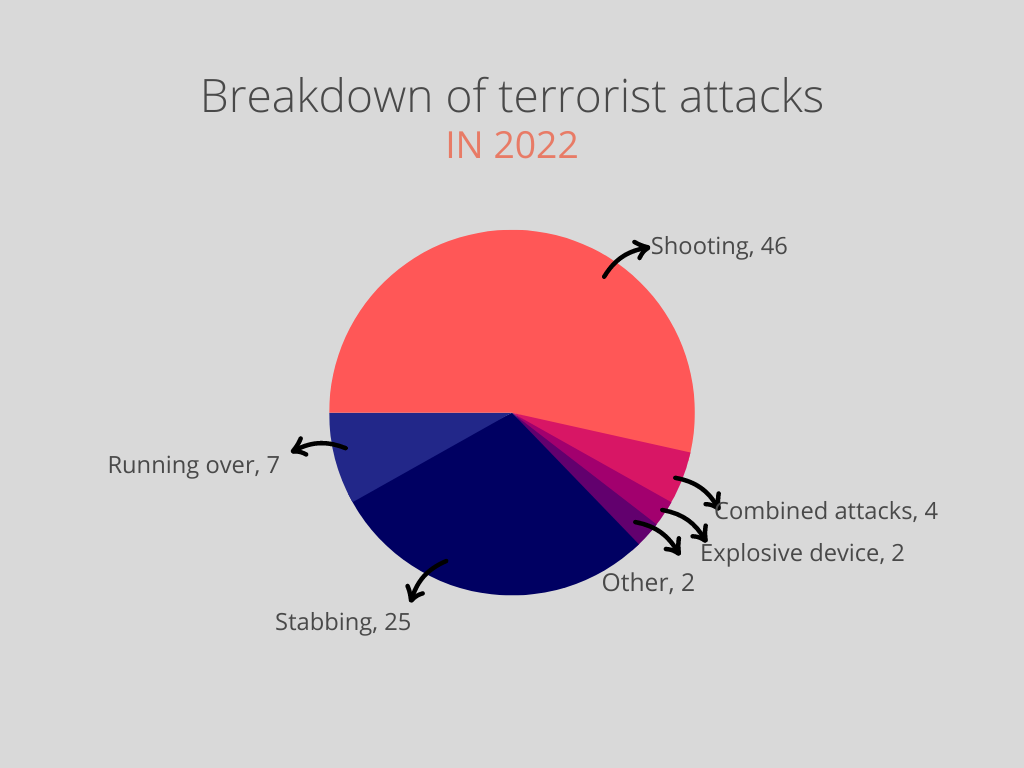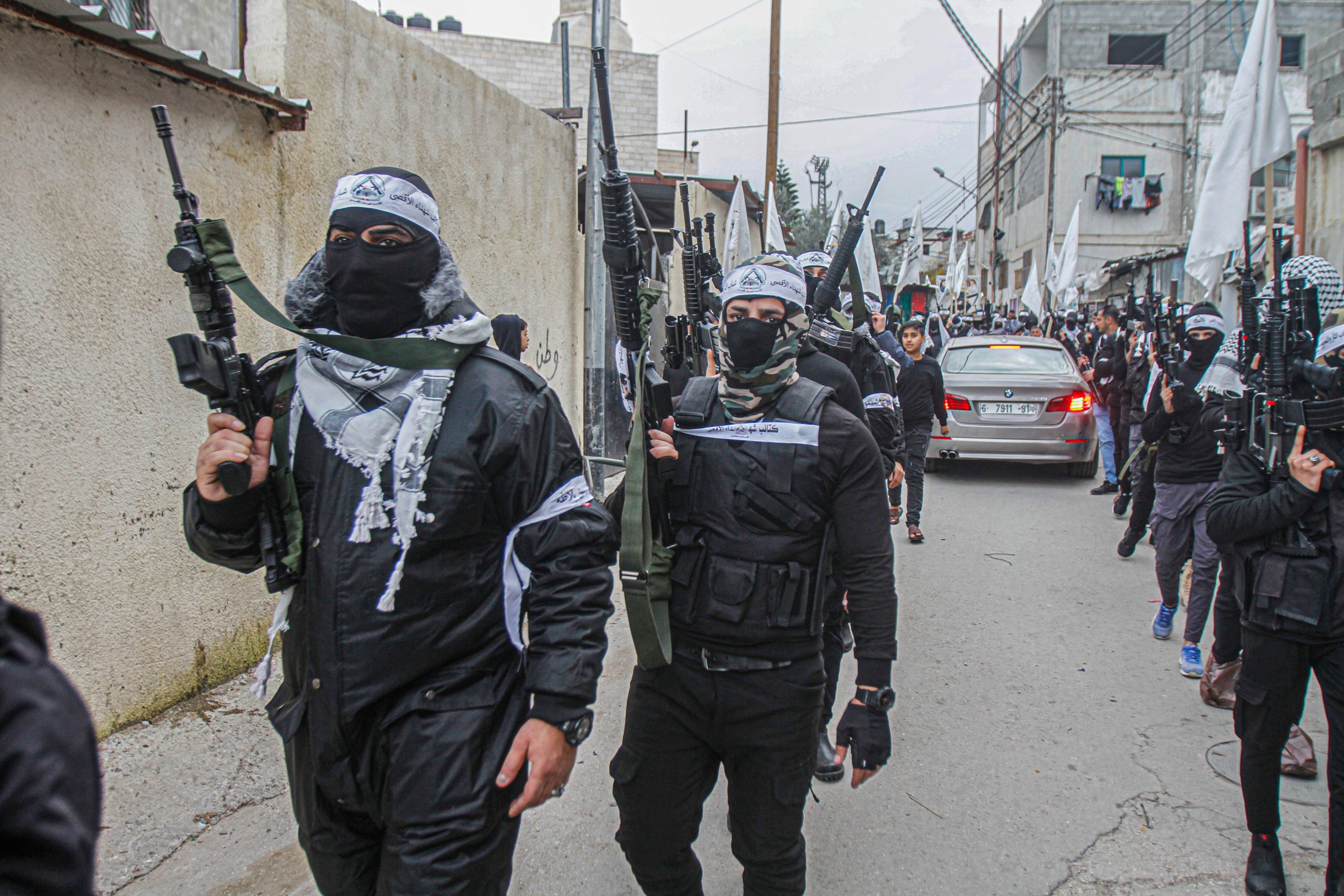Publications
INSS Insight No. 1688, February 7, 2023
The deadly terrorist attack in Jerusalem on Friday evening, January 27, 2023, marked an escalation in recent Palestinian terrorism. Continuation of such incidents is fed by two cycles: the cycle of terrorism – the more the IDF increases its operations against terrorist infrastructure, the more the motivation of young Palestinians increases to engage in armed acts of resistance; and the cycle of weakening of the Palestinian Authority – the more the wave of terrorism rises, the more the PA loses its monopoly on the use of force, its relevance, and its ability to maintain control on the ground. As long as the dysfunction of the PA increases, the more the burden of the Palestinian population will fall on the State of Israel, accelerating the trend of sliding into a one-state reality.
On Friday evening, January 27, 2023, a lone terrorist carried out a shooting attack in front of a synagogue in the Neve Yaakov neighborhood in Jerusalem and murdered seven Israelis. The following day, a 13-year-old Palestinian youth used a pistol to fire on a group of Israelis near the City of David and seriously injured a son and father. It appears that the serious attacks in Jerusalem were acts of revenge by individuals following the battle between Israeli security forces and armed Palestinians on January 26 in the Jenin refugee camp, in which 11 Palestinians were killed – including at least two uninvolved individuals. The results of the attack in Neve Yaakov are liable to inspire copycat attacks by individual terrorists. Israel’s right wing government has urged a set of strong responses to the incidents while designating the Palestinian Authority, which bears some responsibility for creating an atmosphere that supports terrorism, as the body responsible for the current wave of attacks.
In the Israeli government there are those with a certain agenda who see chaos and instability as an opportunity to promote a policy that includes the death penalty for terrorists; legalization of the unauthorized outposts in the West Bank; removal of the Palestinian Authority from Area C, while destroying illegal Palestinian construction; and eviction of the residents of Khan al-Ahmar. These measures match the policy lines of the government included in the coalition agreements. Their implementation indicates a change in the Israeli strategy toward the Palestinian arena, centered on: (1) weakening the Palestinian Authority, with a willingness to bring about its dissolution, instead of maintaining and strengthening it as a stable and functioning governing entity responsible for the needs of the Palestinian population in the West Bank; (2) fighting over Area C by expanding the settlements and pushing the Palestinians out of the area; and (3) creating conditions for applying Israeli sovereignty over the settlements and the Jordan Valley (annexation). These actions will not calm the situation, but rather will continue to undermine stability, sustain the motivation for terrorism, and accelerate the dissolution of the Palestinian Authority.
The cycle of escalation that has continued for almost a year feeds on itself, in the form of action, response, and response to the response. The determined activity by the IDF and security forces to thwart terrorism as part of Operation Break the Wave has already led to approximately 40 people killed on the Palestinian side since the beginning of 2023 – the majority of them terrorist operatives and armed individuals. Meanwhile, a campaign of incitement encouraging armed resistance is underway on Palestinian social media, waged by several elements such as Hamas, groups of young Palestinians such as the Lion's Den, the Islamic Movement in Israel, and the Palestinian Authority. Since the beginning of 2023 there have been dozens of shooting attacks carried out by armed Palestinians on IDF forces, isolated settlements, and the access roads to them. At this stage the Palestinian public is not enlisting in large-scale violent popular resistance, despite its support for the acts of resistance by young Palestinians, who are praised for their defense of the Palestinian people – and thereby supplanting the Palestinian security apparatuses. But connection and agreement between Fatah and Hamas, and extreme countermeasures by Israel, could lead to the outbreak of a large-scale of popular uprising. As the trend of the Palestinian Authority growing weaker, disintegrating, and losing its monopoly on the use of force accelerates, the trend of violent groups arising and filling the vacuum will increase. The IDF will then need to heighten the profile of its activity in Palestinian territory.

The Palestinian Authority does not have a foothold in Jerusalem and it cannot prevent acts of terrorism there. However, it has also lost control to armed groups in Jenin and in Nablus. The encounters between armed Palestinians and IDF forces erode the motivation and the ability of the PA security apparatuses to impose law and order and prompt them to withdraw from the burning areas. Meanwhile, there is more involvement among people serving in the security apparatuses in shooting at IDF forces, and in the past year at least eight members of the Palestinian security apparatuses who participated in battles with IDF forces in Nablus and Jenin were killed.
There are many factors underlying the weakness of the Palestinian Authority: the lack of a political horizon; blocked access to territories that they see as designated for the establishment of a Palestinian state; the loss of legitimacy of its corrupt leaders and the rule of Mahmoud Abbas (Abu Mazen) in the eyes of the Palestinian public (a poll conducted among the Palestinian population in December 2022 showed that about 80 percent of respondents believe that the Palestinian Authority is a corrupt entity, and 77 percent demand the resignation of Abu Mazen); the economic crisis, the decrease in income from external donations and in the transfer of the tax money that Israel collects for the PA; the weakening of the Palestinian security apparatuses and limitations on their equipment and modus operandi; the political strengthening of Hamas and the deepening of its control over the Gaza Strip; and internal struggles in the Fatah movement, with an emphasis on the succession struggle on the “day after Abbas."
Israel and the Palestinian Authority have an interest in continuing the security coordination, especially in a turbulent period. In the Palestinian view, the coordination helps maintain the PA and Fatah's control vis-à-vis Hamas. However, following the Jenin incident, the PA announced the suspension of the security coordination with Israel. This decision was also influenced by Palestinian public opinion, which supports the resistance of Palestinian young people and sees the Palestinian security forces as collaborators with the Israeli occupation. Likewise encouraging this sentiment were the Israeli government's decisions to seize some of the tax money (used to pay terrorists and their families and compensate families of victims of terrorism) and increase the enforcement of prohibitions on construction for Palestinians in Area C, as well as the intention to legalize illegal outposts and to expand the settlements.
Conclusion and Recommendations
Israel is waging a campaign against Palestinian terrorism, but losing its control over the escalation dynamics. The motivation of the perpetrators of the terrorist attacks, most of them young people who do not belong to the terrorist organizations, is twofold – against the Israeli occupation, and against the rule of the Palestinian Authority, which in their eyes is illegitimate, is corrupt, and collaborates with the “occupation." Both cycles are self-feeding in the continuation of the incidents: the cycle of terrorism – the more the IDF increases its preventive operations and operations against terrorist infrastructure, particularly in the northern West Bank, the greater the motivation of young Palestinians to engage in armed acts of resistance and of members of the security apparatuses to engage in shooting attacks; and the cycle of weakening of the Palestinian Authority: the more the wave of terrorism rises, the more the PA loses its monopoly on the use of force, its relevance, and its ability to control on the ground.
In advance of the middle of March, the month of Ramadan, the Israeli government must adopt a responsible policy that aims to calm the situation and not ignite it further, and refrain from extreme measures. In this context, particular attention is needed to the volatility of the Temple Mount (ensuring conduct in accordance with the status quo) and friction in Jerusalem, which projects onto other arenas, including the Arab community in Israel.
The Palestinian Authority is not the main catalyst behind the terrorism, and furthermore, it is weakened and does not have the power to neutralize the terrorist elements. If the government of Israel adheres to a policy of punishing the PA and weakening it in response to each incident of terrorism, without thoroughly assessing the trends of its dissolution and the loss of its legitimacy in the eyes of the Palestinian public, the question of its survival will intensify. To the extent that the Palestinian Authority stops functioning and providing for the needs of the Palestinian population, the onus of Palestinian civilian needs will fall on the State of Israel, thus accelerating the most disturbing trend from a long-term perspective – the slide into a one state reality and the loss of the ability to formulate a political arrangement in the future.



